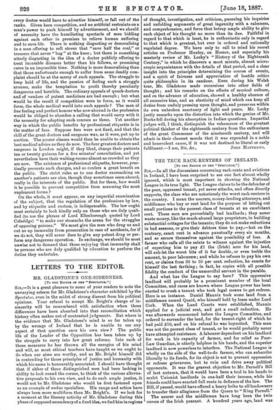LETTERS TO THE EDITOR.
MR. GLADSTONE'S ONE-SIDEDNESS.
[co THE EOM. Or THZ SPECTATOI....1 SIH,It is a great pleasure to some of your readers to note the unvarying esteem for Mr. Gladstone's character exhibited by the Spectator, even in the midst of strong dissent from his political opinions. Your refusal to accept Mr. Bright's charge of in- sincerity will be remembered with satisfaction when these differences have been absorbed into that reconciliation which history often makes out of contrasted judgments. But where is the evidence that Mr. Gladstone's mind is so far taken up by the wrongs of Ireland that he is unable to see any aspect of that question save his own view ? The public life of the Leader of the Opposition has been taken up by the struggle to carry into law great reforms. Into each of these measures he has thrown all the energies of his mind and will, as most ethical teachers have taught us we ought to do when our aims are worthy, and as Mr. Bright himself did in contending for those principles of justice and humanity with which his name is honourably associated. I should have thought that if either of these distinguished men had been lacking in ability to look round the corner, to think of the various alterna- tive proposals to his own view, and to do each ample justice, it would not be Mr. Gladstone who would be first fastened upon as an example of undue specialism. His range and action have always been more multiform than Mr. Bright's. If we look for a moment at the literary activity of Mr. Gladstone during this phase of supposed ascendency of a fixed idea,we find him in regions of thought, investigation, and criticism, pursuing his inquiries and unfolding arguments of great ingenuity with a calmness, and comprehension, and force that betray ample ability to give each object of his thought no more than its due. Faithful in regard to that which is least, he is enthusiastic only in regard to that which is greatest, but ever in ordered and rationally regulated degree. We have only to call to mind his recent articles on Professor Huxley, on Homer, and especially his masterly review of Mr. Lecky's "History of the Eighteenth Century," in which he discovers a most minute, almost micro- scopic acquaintance with the details of that period, and a clear insight into the principles determining the course of events, and a spirit of fairness and appreciation of hostile critics quite philosophic in its candour. Even daring his Welsh tour, Mr. Gladstone made excursions into other fields of thought ; and his remarks on the effects of musical culture, and on the advance of education, showed a healthy absence of all excessive bias, and an elasticity of mind which can keep all duties from unduly pressing upon thought, and preserves within its own unbroken sanctuary of light and peace. Mr. Lecky justly remarks upon the distortion into which the genius of Mr. Burke fell during his absorption in Indian questions. Impartial judges will, I think, distinguish the vehemence of the greatest political thinker of the eighteenth century from the enthusiasm of the great Commoner of the nineteenth century, and will admit in their clearest moods that it was expended in a noble and benevolent cause, if it was not destined to literal or early


































 Previous page
Previous page